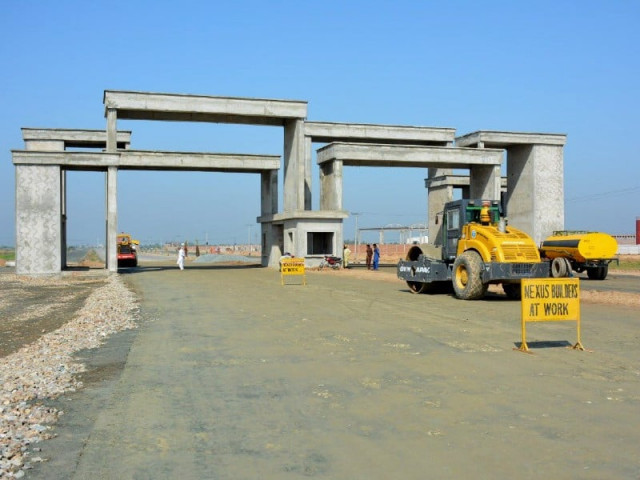China to review new SEZ proposal
Govt-owned zone will help reduce construction time, address financing issues

China has agreed to consider Pakistan’s request for setting up a government-owned Special Economic Zone (SEZ) aimed at reducing construction time and addressing financing issues amid Islamabad’s inability to make special zones operational.
The request was made during sixth meeting of the Joint Working Group (JWG) on Industrial Cooperation on Friday.
The meeting was co-chaired by Board of Investment Secretary Fareena Mazhar and National Development and Reform Commission (NDRC), China, Director General Ying Xiong.
The Board of Investment presented proposals for establishing an SEZ on a government-to-government (G2G) basis and a CPEC (China-Pakistan Economic Corridor) Tower in Islamabad, according to a statement.
The zone is being proposed under the broader CPEC framework.
Initially, China was reluctant to consider the request and was not willing to include the issue in the agenda. Now, it has agreed to make a favourable review of the proposal.
According to the concept, Pakistan will offer free-of-cost land to China while investment will be made by Beijing to have a real plug-and-play zone.
Setting up a government-owned economic zone was also on the agenda of the prime minister’s visit to China, but the premier did not take it up with the Chinese authorities.
Pakistan and China had agreed to set up nine prioritised SEZs under CPEC but during the past seven years no substantial progress could be made on the zones.
During the last meeting of CPEC Joint Cooperation Committee (JCC), Pakistani side had informed Chinese officials that funds were allocated for the provision of electricity and gas at zero point of the Rashakai SEZ in Khyber-Pakhtunkhwa (K-P), Allama Iqbal Industrial City SEZ in Punjab, Dhabeji SEZ in Sindh and Bostan SEZ in Balochistan.
However, these zones are still not ready for setting up factories.
In the last JCC meeting, China had hoped that in order to create favourable conditions for attracting investment, Pakistan would establish external infrastructure facilities and provide one-window service in the SEZs at an early date.
A statement issued by the Board of Investment underlined that both sides reviewed the progress on CPEC SEZs, particularly Rashakai, Allama Iqbal, Dhabeji and Bostan SEZs, and expressed satisfaction over the achievements made so far.
The developer of Rashakai SEZ demanded during the meeting that Pakistan should waive import duties on raw material and semi-finished goods for those investors who would make investment in the SEZs.
The developer argued that Chinese investors were more keen to invest in Far Eastern countries due to the benefits being offered from the platform of Regional Comprehensive Economic Partnership (RCEP) – a free trade agreement signed by 10 members of the Association of Southeast Asian Nations (Asean) plus Australia, China, Japan, New Zealand and South Korea.
The Board of Investment authorities have in the past expressed the desire that Pakistan should either become part of RCEP or China may offer similar benefits to make the country an attractive destination for Chinese investors.
One of the reasons for the lukewarm Chinese interest in Pakistani zones was that the developers, particularly of Rashakai zone, were demanding very high land prices.
The per-acre price being demanded by the Rashakai zone developer was almost double the price being sought by the Allama Iqbal zone, Faisalabad. The absence of infrastructure and utility services were the other key reasons that were keeping investors away from the zones.
The Board of Investment was not in favour of giving any further tax concessions on the ground that it would further edge out the local investors, who already complain about giving undue advantage to the Chinese investors.
During the JWG meeting, China also agreed to set up a mineral and mines sub-group aimed at tapping the potential of the sector.
The Chinese side showed great interest in the mining sector of Pakistan, according to the statement.
China Geological Survey and Metallurgical Corporation of China presented their proposals for possible collaboration in the mining sector of Pakistan, it added.
Pakistan Mineral Development Corporation (PMDC) also delivered a detailed presentation, highlighting the potential of the sector and possible investment opportunities for Chinese investors.
China will assist Pakistan in conducting a diagnostic study of the mineral and mines sector.
Furthermore, both sides vowed to take forward the framework agreement on industrial cooperation in a pragmatic manner, which was signed during the PM’s visit to China in February.
However, the implementation plan for the framework agreement has not yet been finalised.
The Board of Investment official handout noted that contrary to the previous JWG meetings, the sixth JWG witnessed active participation and presentations by the provincial NDRCs in China to strengthen business-to-business collaboration at the provincial levels between the two countries.
Published in The Express Tribune, April 9th, 2022.
Like Business on Facebook, follow @TribuneBiz on Twitter to stay informed and join in the conversation.



















COMMENTS
Comments are moderated and generally will be posted if they are on-topic and not abusive.
For more information, please see our Comments FAQ